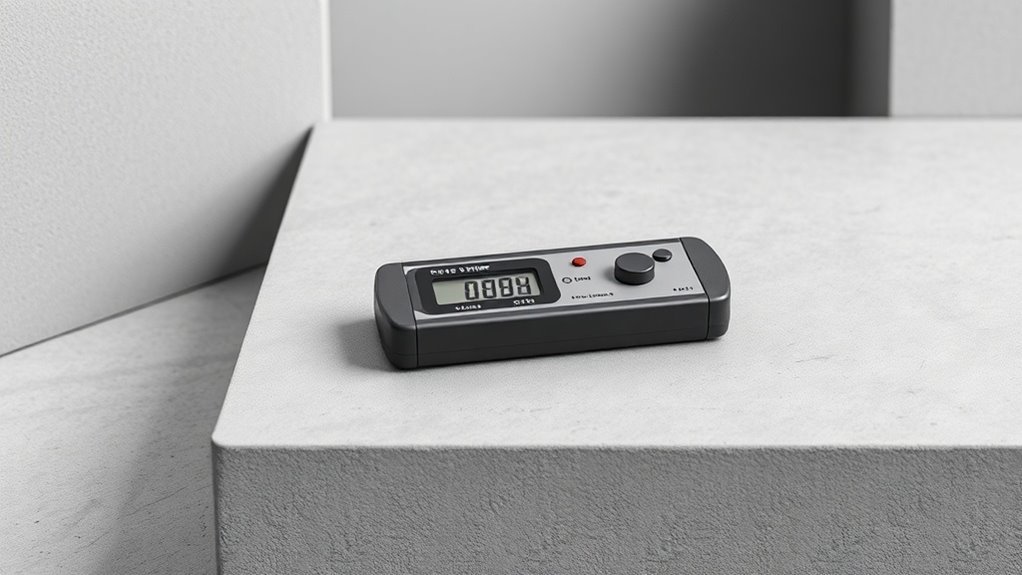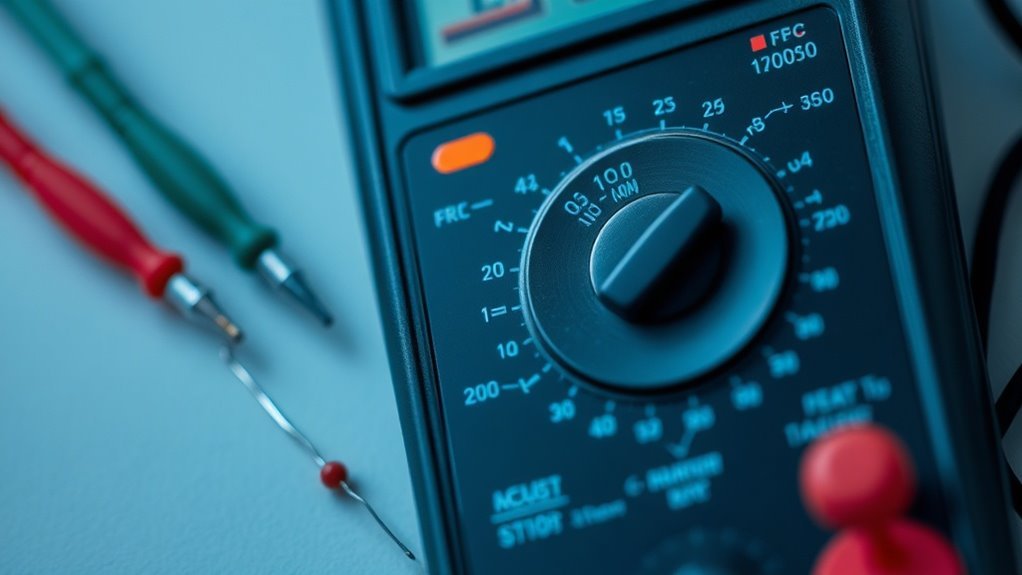How Fuse Testers Help in Electrical Safety

Fuse testers greatly enhance your electrical safety by checking the condition of fuses in your electrical circuits. They help you identify blown fuses, preventing appliance damage and costly repairs. By regularly testing, you can detect issues like overloaded circuits or faulty wiring before they escalate into emergencies. Plus, fuse testers play a key role in preventing electrical fires by ensuring current levels are safe. Want to learn more about their effective use? Keep exploring!
Key Takeaways
- Fuse testers identify blown fuses quickly, preventing appliance damage and reducing the risk of electrical malfunctions.
- Regular testing detects overloaded circuits, which are common precursors to electrical fires.
- They ensure compliance with safety standards and regulations by regularly assessing electrical systems.
- By monitoring current levels, fuse testers help avoid overheating and potential ignition sources in circuits.
- Using fuse testers enhances overall electrical safety by identifying issues before they escalate into hazardous situations.
Understanding Fuse Testers: What They Are and How They Work
When working with electrical systems, understanding fuse testers is essential for ensuring safety and functionality.
A fuse tester is a handy device that helps you check the condition of fuses in your electrical circuit. It identifies whether a fuse is blown or still operational, which can prevent damage to your electrical appliances.
Most testers work by checking continuity; when you insert the fuse into the tester, it sends a small current through the circuit. If the fuse is intact, the circuit completes, and an indicator light will show it’s good. If not, the light won’t activate, indicating a blown fuse.
You’ll not only save time troubleshooting electrical issues but also enhance the reliability of your system by using a fuse tester effectively.
The Importance of Regular Fuse Testing

Regular fuse testing is essential for maintaining electrical safety in any setting. It helps guarantee that your electrical systems are functioning correctly and can prevent dangerous incidents. Here’s why you shouldn’t overlook this critical task:
- Early Detection: Identifying potential issues before they escalate can save you from costly repairs and accidents.
- Compliance: Regular testing helps meet safety standards and regulations, keeping your workplace or home compliant and safe.
- Peace of Mind: Knowing your fuses are reliable reduces anxiety about electrical hazards, allowing you to focus on other priorities.
Incorporating regular fuse testing into your routine isn’t just a wise choice; it’s a necessity for guaranteeing electrical safety and reliability. Additionally, implementing regular calibration of your electrical tools enhances their overall performance and safety.
Don’t wait; make it a priority today!
How to Use a Fuse Tester Effectively
Using a fuse tester effectively can make all the difference in ensuring your electrical system remains safe and functional. First, always turn off the power to the circuit you’re testing.
Next, connect the fuse tester to the circuit or directly to the fuse you want to check. Look for the indicator lights on the tester; typically, a green light signals a good fuse, while a red light indicates a blown one. If you’re uncertain, consult the tester’s manual for specific instructions.
After testing, remember to disconnect the tester and restore power gradually. Regularly using this device not only helps identify faulty fuses but also enhances your overall electrical safety. Additionally, performing continuity testing on circuit pathways before or after checking fuses can further ensure the system’s integrity. Stay proactive, and keep your components running smoothly!
Common Problems Identified by Fuse Testers
Fuse testers not only indicate whether a fuse is good or blown but also help uncover various underlying issues within your electrical system. By using one, you can identify common problems that could lead to bigger concerns down the line.
Here are three main issues fuse testers can reveal:
- Overloaded Circuits: If fuses blow frequently, it might signal that your circuits are overloaded, risking component damage.
- Wiring Issues: A fuse tester can help detect faulty or deteriorating wiring, which can cause shorts or inconsistent power supply.
- Equipment Malfunctions: If certain devices continually blow fuses, it may indicate that there’s a fault in that specific equipment, requiring further investigation.
Regular testing keeps your electrical systems safe and functioning effectively. Additionally, using proper tools like fuse testers plays a crucial role in enhancing electrical safety.
The Role of Fuse Testers in Preventing Electrical Fires
When you’re using electrical systems, it’s essential to keep an eye on overloaded circuits that can lead to dangerous situations.
Fuse testers help guarantee you have the right fuse ratings, preventing potential electrical fires.
Identifying Overloaded Circuits
Overloaded circuits are a common cause of electrical fires, and detecting them early can make all the difference in preventing disasters.
Fuse testers are essential tools that help you identify these problematic circuits. Here’s how they can make your home safer:
- Monitor Current Levels: Use a fuse tester to measure the amperage of your circuits, ensuring they don’t exceed safe limits.
- Identify Heat Build-Up: Fuse testers can reveal hot spots that indicate excessive load and potential failure points.
- Check Fuse Integrity: They help verify if fuses are correctly protecting circuits, ensuring they’ll blow when overloaded.
Ensuring Proper Fuse Ratings
Ensuring that your fuses are rated correctly is essential for maintaining electrical safety in your home. Incorrect fuse ratings can lead to overheating and potentially spark electrical fires.
Using a fuse tester can help you determine if your fuses are appropriate for your specific circuits. With a fuse tester, you can check if a fuse blows at the right amperage, ensuring it protects against overloads effectively. If a fuse has a higher rating than recommended, it won’t blow when it should, leaving your wiring vulnerable.
Regularly testing fuses allows you to spot these issues before they escalate. Ultimately, proper fuse ratings are your first line of defense against electrical hazards and can keep your home and family safe.
Incorporating Fuse Testers Into Your Electrical Safety Routine
Incorporating fuse testers into your electrical safety routine is essential for keeping your home safe.
By setting regular testing intervals, you can quickly spot faulty fuses before they lead to bigger issues.
Don’t overlook the importance of this simple practice—it could save you from potential hazards.
Regular Testing Intervals
While it’s easy to overlook routine checks, regularly testing your fuse systems is essential for maintaining electrical safety.
You might ask yourself when to perform these tests, and here’s a simple guideline to follow:
- Monthly Checks: Test your fuse system monthly to catch any potential issues early, guaranteeing it operates smoothly.
- Before Major Events: Prior to hosting large gatherings or events, confirm that your fuses are functioning properly to prevent any unexpected outages.
- After Repairs or Upgrades: Always test after any electrical repairs or system upgrades to ascertain everything is working safely.
Identifying Faulty Fuses
Since faulty fuses can lead to significant safety hazards, it’s crucial to integrate fuse testers into your electrical safety routine.
These handy tools allow you to quickly assess whether a fuse is functioning correctly or not. When you suspect a fuse might be faulty, you can use a fuse tester to check for continuity. Simply disconnect the power and test the fuse—if it fails, you’ll know it’s time to replace it.
Regularly checking your fuses with a tester can prevent electrical failures and protect your appliances. Don’t wait for problems to arise; making this a habit can save you time and money while keeping your home safe from electrical hazards.
Always prioritize safety in your approach.
Questions
Can Fuse Testers Detect Issues in Circuit Breakers as Well?
Yes, fuse testers can help identify issues in circuit breakers. They assess the function and integrity of circuits, allowing you to spot potential problems before they escalate, ensuring your electrical system remains safe and efficient.
How Often Should I Replace My Fuse Tester?
How often should you replace your fuse tester? Typically, it’s wise to check it annually or after significant use. Wouldn’t you want to guarantee it’s accurate when you need it most? Regular maintenance keeps you safe!
Are There Different Types of Fuse Testers Available?
Yes, there are different types of fuse testers available. You’ll find analog, digital, and multifunction testers, each offering unique features. Depending on your needs, choose one that best suits your testing requirements and preferences.
Can I Use a Fuse Tester for Automotive Fuses?
Absolutely, you can use a fuse tester for automotive fuses. Think of it as a tool that lights the way in a dark tunnel, helping you quickly identify issues that could lead to bigger problems.
Is Professional Calibration Necessary for Fuse Testers?
Yes, professional calibration’s important for ensuring accuracy. While you can use a fuse tester without it, regular calibration helps maintain reliability and confidence in your results, especially in critical applications where precision matters.
Conclusion
Incorporating fuse testers into your electrical safety routine isn’t just smart—it’s essential. Think of it as a lighthouse guiding you through the stormy seas of electrical hazards, helping you navigate potential dangers before they become disasters. By regularly testing your fuses, you not only protect your home but also gain peace of mind. So why take chances? Embrace the power of fuse testers, and keep your electrical system safe and sound. Your safety is worth it!






